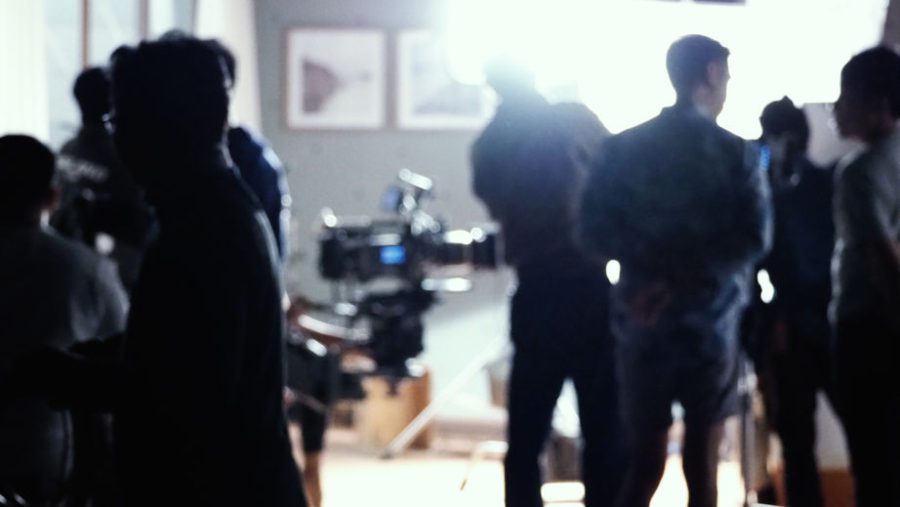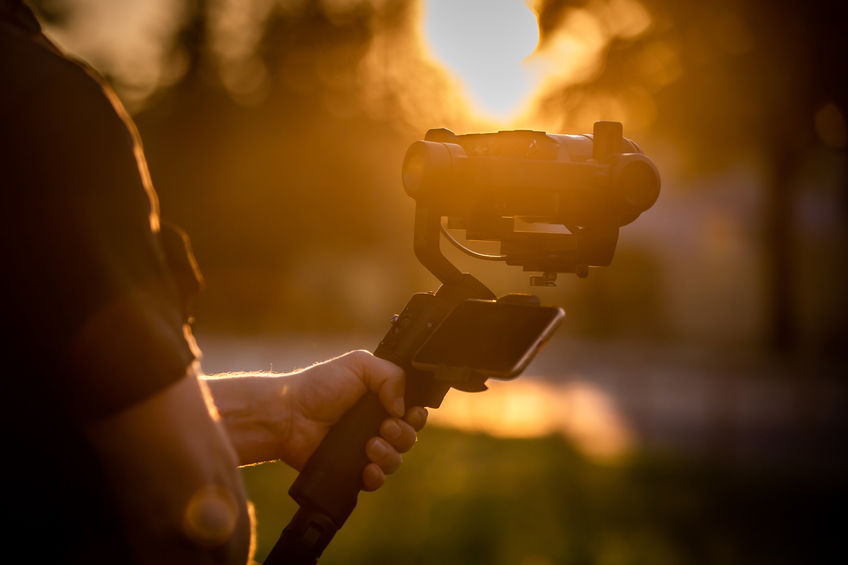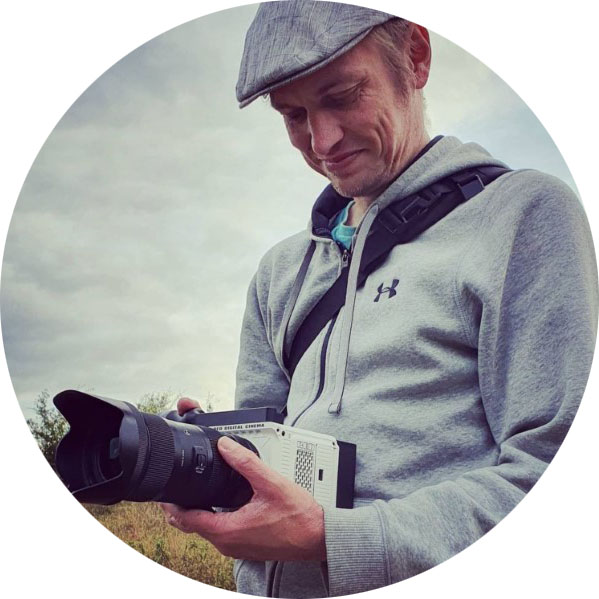DISCLOSURE: AS AN AMAZON ASSOCIATE I EARN FROM QUALIFYING PURCHASES. READ THE FULL DISCLOSURE FOR MORE INFO. ALL AFFILIATE LINKS ARE MARKED #ad
Here are ten inspiring ways to teach yourself filmmaking online and offline without going to film school.
I’ve included links to recommended reading, podcasts, online courses, and more.
1. Watch Lots of Movies

If you want to learn filmmaking, watch movies! Movies let you learn from the top directors, cinematographers, screenwriters, and actors.
And top directors do it, too. As Quentin Tarantino famously put it:
When people ask me if I went to film school I tell them ‘no, I went to films.
Quentin Tarantino in a 2004 interview with Andrew Walker from BBC News.
Watch movies that have inspired other filmmakers
First, you should try to watch movies that have inspired other filmmakers. Look at the lists of essential films compiled by directors and critics.
Watching films recommended by other filmmakers helps build your movie knowledge.
Check out my list of the 30 Best Films To Watch To Learn Filmmaking On Your Own.
Analyze films

So, what should you look for when watching movies? Well, everything really… even the bad stuff, so you don’t repeat the same mistake.
Pay attention to each shot’s composition, including the camera angles, lighting, and actors’ placement.
You may even want to take notes – but wait with the analyzing and notetaking until the second time you watch it, so you can still enjoy it the first time. That way, you’ll get a better overall feel for the movie.
After watching a movie, review the details, such as the plot, themes, acting, cinematography, musical score, sound design, production design, special effects, and editing.
Check out behind-the-scenes footage
When you watch a DVD or Blu-Ray movie, make sure that you check out the special features. You can also seek it out online—fx on YouTube.
Many releases include a variety of helpful extras, such as a director’s commentary or behind-the-scenes footage.
These extra features occasionally give you valuable insight into the filmmaking process.
2. Read Books on Filmmaking

Use books to further your filmmaking knowledge and watch movies. Search for books on starting with filmmaking or specific filmmaking topics, such as lighting or basic cinematography principles.
Successful directors and screenwriters write some of the best books on filmmaking. For example, in Making Movies, legendary director Sidney Lumet provides a guide to the craft and business of making movies.
Robert Rodriguez chronicles his path to making his first movie in Rebel Without A Crew. The book provides tips for breaking into the industry and putting together a film on a small budget.
On Directing Film by David Mamet offers insight into his process for bringing a script to life and includes suggestions for collaborating with actors, cinematographers, and producers.
Akira Kurosawa shares his wisdom in Something Like an Autobiography. The book gives readers a closer look at Kurosawa’s approach to filmmaking and finding happiness outside of the industry.
These are just a few books you should add to your reading list. Keep seeking more books on the topic to broaden your knowledge of filmmaking techniques.
3. Watch Tutorials and Lectures on YouTube

YouTube is a great source for those wanting to learn filmmaking without attending film school. You can find videos on lighting setups, sound recording techniques, video editing, color grading, VFX work, and more.
Watching YouTube videos on filmmaking often allows you to see real examples of the topics being discussed.
For example, when watching a video on lighting techniques, you may see diagrams or comparisons of different lighting setups.
It is often easier to understand techniques when you see them in action. People also tend to retain more information when they view content than when they read.
Try to watch at least one video on filmmaking each day. Some tutorials last just a few minutes, allowing you to learn something new during a work break or before bed.
4. Listen to Filmmaking Podcasts

The next source for expert filmmaking advice is podcasts. Many independent filmmakers and established pros have podcasts that dissect the filmmaking world.
For example, director Kevin Smith hosts the “Smodcast” podcast, which includes several podcast episodes dedicated to independent filmmaking.
Other popular filmmaking podcasts include “Scriptnotes,” “The Wandering DP Podcast,” and “How Did This Get Made?”
However, dozens of other podcasts are devoted to specific areas of filmmaking, such as screenwriting or making movies on shoestring budgets.
Podcasts are convenient as you can listen to them while you do other things. You can learn more about filmmaking while doing the laundry, washing dishes, jogging, or commuting to your day job.
5. Take Online Filmmaking Courses
You can also learn filmmaking online for free, thanks to various online courses open to the public. Online filmmaking courses provide a little more depth than watching tutorials on YouTube or reading a book.
Massachusetts Institute of Technology (MIT) offers dozens of free online courses through the MIT OpenCourseWare website. The courses typically include video lectures, a course syllabus, downloadable materials, and assignments.
A popular starting point for aspiring filmmakers is the Philosophy of Film. The course provides a philosophical analysis of movies. It offers a closer look at how films use different techniques to communicate specific messages.
MIT’s Introduction to Video is also recommended. This class introduces video recording and editing techniques. Instead of video lectures, this course includes recommended reading, assignments, and projects.
You can also check out masterclasses with A-list directors, actors, and screenwriters. These are paid classes, but you get to learn from the top dogs in the business.
6. Volunteer for Local Film Projects

Volunteering or finding an internship is a great way to start learning the ropes of filmmaking.
This is a little easier for those who live in entertainment hubs where movies and TV shows are frequently filmed. However, you may still find smaller productions outside LA, New York City, Vancouver, and Toronto.
Search online for upcoming projects in your area. When a small film crew comes to a city to film a movie, they can often use volunteers to handle the grunt work, such as helping run cables to the lighting and sound equipment or running errands.
Places I recommend searching include:
- Crowdfunding platforms: Kickstarter Film or Indiegogo. Look at their film section. Often, a new indie production or short film needs more than money; it also needs helping hands). Reach out to the people behind the project and offer your services.
- YouTube: Search for “proof of concept” films. These are often made by filmmakers who have made something to pitch to producers or to test out some things for themselves that they want to develop into a short or indie feature.
- Reddit: Look through r/filmmaking, r/cinematography, r/screenwriting and similar sub-forums
Spending time on a set and working with filmmakers helps you become more familiar with the world of movie-making.
7. Join Online Forums Dedicated to Filmmaking
If you have a question about any aspect of filmmaking, you can often find an answer on filmmaking forums or social media groups.
Forums and online groups also frequently discuss a wide range of topics. You can review opinions from multiple sources to ensure that you get the best advice.
Joining a social media community dedicated to filmmaking may also help you find independent filmmakers in your local area.
8. Collaborate with Other Creatives in Your Area
Unless you live in a remote area, other creative individuals are likely in your town or city. Look for local film societies and groups dedicated to filmmaking. You may find other aspiring filmmakers.
Collaborating with others allows you to learn from their experience while honing your filmmaking skills. You may work together on a project, share ideas, or ask others for advice on individual projects.
The connections you gain may also help you get your foot in the door as your peers move on to bigger and better projects.
9. Use the Equipment That You Have

As an aspiring filmmaker, you may not have the budget for the latest professional cinema camera.
Do not use this as an excuse to procrastinate. Access to equipment should not stop you from learning how to become a filmmaker.
Use the equipment that you already have. Almost everyone has a smartphone or tablet these days. You can get dedicated filmmaking accessories and lenses to improve your smartphone’s camera capabilities.
Also, ensure you work on lighting using natural light to your advantage or getting artificial light. The low-quality camera sensors in many mobile devices require more lighting to capture clear, crisp images. Using an LED video light is a great way to improve the quality of your video footage.
After recording, use free video editing software to start compiling your footage.
10. Start Making Short Films
If you want to know how to start filmmaking, you need a camera and actors. Instead of waiting for a specific opportunity, start making short films.
The bottom line is that sometimes you need to jump into something. If you want to become a filmmaker, start filming.
Even if you do not have friends or family willing to act in your short films, you can start experimenting with camera work and editing. You can record your pets, strap a camera to a helmet, and record a bicycle ride.
The goal is to keep filming and editing. Each project will teach you something new or give you another topic to explore. Before long, you may realize that you are finally on the path to becoming a filmmaker.

